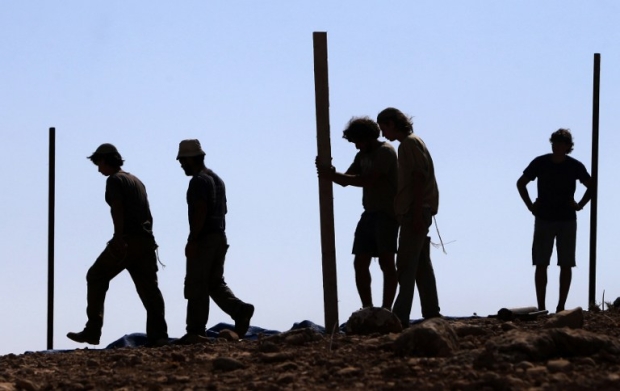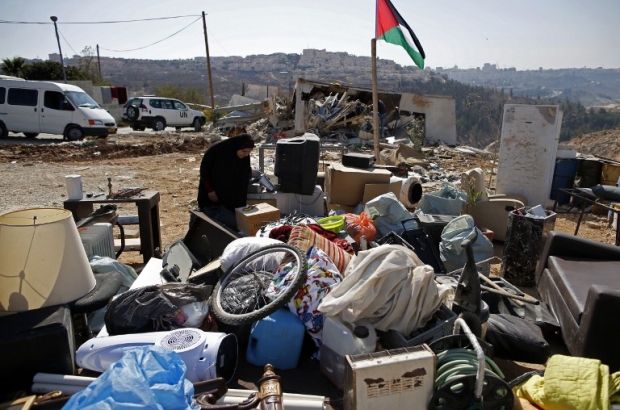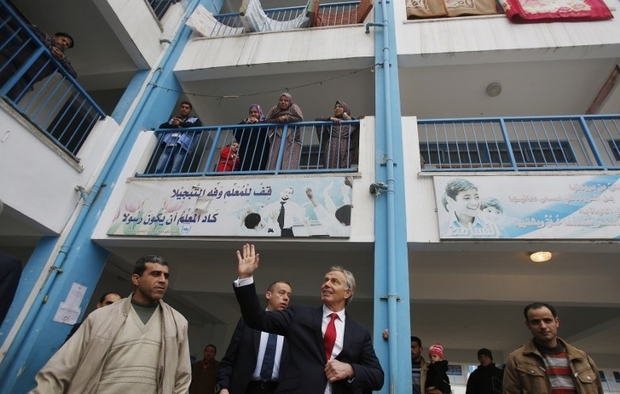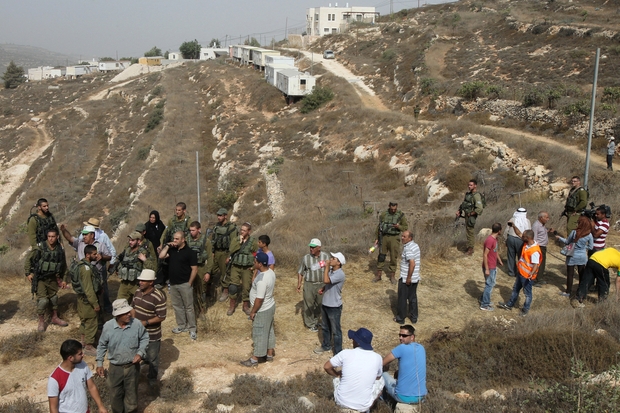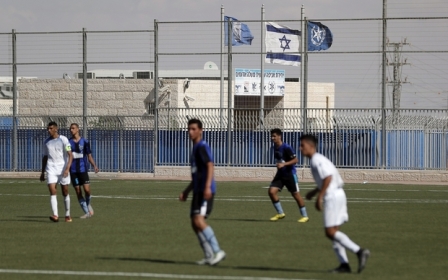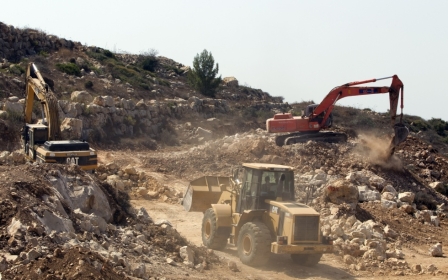Empty condemnation of Israeli settlements doesn't work: We need action

Israel is the only state in the world that believes that it can continue to build settlements only for Jews in East Jerusalem, the West Bank and the Syrian Golan Heights until such a time that their fate is decided through negotiations. Its most important ally, the United States, currently considers them “illegitimate” and an “obstacle to peace”, though its position has changed over the years.
The long established convention of issuing statements after each announcement of a new settlement or an expansion has simply failed
The United Kingdom frequently “condemns” settlements as it considers them “illegal under international law” adding that new announcements “take us further away from a two-state solution and raises serious questions about the Israeli government’s commitment to achieving the shared vision of Israel living side-by-side a viable, independent, and contiguous Palestine state”.
In the past, the British government has also used terms in reference to settlement building such as “concerned”, “deeply concerned”, “extremely concerned”, “profoundly concerned”, “deplores”, “very disappointed”, “deeply disappointed”, “extremely disappointing and unhelpful”, “provocative actions”, “provocative and deeply counter-productive” and “extremely worrying”.
The European Union says settlements are “illegal under international law, constitute an obstacle to peace and threaten to make a two-state solution impossible”.
The position of the Canadian government is that the “Israeli settlements in the occupied territories are a violation of the Fourth Geneva Convention. The settlements also constitute a serious obstacle to achieving a comprehensive, just and lasting peace".
Lowest common denominator
The Australian government’s approach to settlements is more problematic from a Palestinian point of view and is, in fact, out of step with most others.
In 2014, Canberra’s stance on the settlements moved significantly as then Prime Minister Tony Abbott ruled out using the term “occupied” when describing Israeli settlements in East Jerusalem. The attorney general, George Brandis, speaking on behalf of the minister for foreign affairs, Julie Bishop, said it was "unhelpful" to refer to historic events when describing these areas, given the ongoing Middle East peace process.
"It should not and will not be the practice of the Australian government to describe areas of negotiation in such judgmental language," he added.
The different kind of language used to express individual governments’ views on Israeli settlements clearly has an impact on statements made by the main international body that attempts to speak with one voice on the issue. The reader may expect this to be the United Nations, but in fact it is the Middle East Quartet which specifically articulates this view and, in doing so, seems to be choosing the language of the lowest common denominator.
Quartet’s feeble words
The Quartet is made up of the UN, the US, the EU and Russia. In its a recent report, the focus of the language used when it came to settlements was not one of calling them “illegal” or “illegitimate”, but to describe their impact on the prospect of the two-state solution. It talked of how settlement construction is one of the trends “undermining hopes for peace”.
'When we're talking about how good friends treat one another, that is a source of serious concern as well'
- Mark Toner, State Department spokesman
It noted that “the continuing policy of settlement construction and expansion, designation of land for exclusive Israeli use, and denial of Palestinian development is steadily eroding the viability of the two-state solution”. It suggested that “this raises legitimate questions about Israel’s long-term intentions, which are compounded by the statements of some Israeli ministers that there should never be a Palestinian state.
In fact, the transfer of greater powers and responsibilities to Palestinian civil authority in Area C contemplated by commitments in prior agreements has effectively been stopped, and in some ways reversed, and should be resumed to advance the two-state solution and prevent a one-state reality from taking hold".
The report’s only recommendation on this matter was that “Israel should cease the policy of settlement construction and expansion, designating land for exclusive Israeli use, and denying Palestinian development”.
Perhaps the most interesting statement on settlements came recently from the US. Reacting to Israel’s announcement that it would build a new settlement, it “strongly condemned the announcement”. State Department spokesman Mark Toner said that the new settlement would be "another step towards cementing a reality of perpetual occupation" that would "further call into question Israel's commitment to achieving a negotiated peace".
Interestingly, he linked the announcement to America’s decision to gift Israel with a 10-year $38bn military aid package. It was "deeply troubling", said Toner, that Israel would make its announcement so soon after the conclusion of the aid package.
"I guess, when we're talking about how good friends treat one another, that is a source of serious concern as well," he said.
Failed strategy
It seems clear to me that the long established convention of simply issuing statements following each announcement either of an expansion of settlements or the establishment of new ones has failed. Clearly, no amount of creative language to censure settlements has worked.
The international community should spend less time searching for acceptable language to indicate their displeasure with Israel and take firm action instead
Every time Israel makes a new announcement, I suspect that countries which feel they must respond only face the dilemma of which exact words to use. I have made this point repeatedly at meetings with the Foreign & Commonwealth Office in the UK and the look on the faces of the officials we have met almost confirmed this.
Israel knows that it can ride out any criticism and build. It is certain there will be no real repercussions. In fact, Israeli politicians feel so emboldened that Education Minister Naftali Bennett recently called for Israel to build more settlements in response to any UN criticism.
By 2017, the “temporary” occupation of East Jerusalem, the West Bank, Gaza and the Golan Heights will have lasted 50 years. Talks between the Palestinians and the Israelis about ending it and signing a peace deal will have gone on for 24 years. The number of illegal settlers will be pushing towards the one million mark. All efforts to cajole Israel into ending the occupation have failed.
The international community should spend less time searching for acceptable language to indicate their displeasure with Israel and take firm action instead, particularly on settlements. They should be declared illegal and any trade with them should be prohibited. That would be a start in shifting the dynamics of the conflict.
- Kamel Hawwash is a British-Palestinian engineering professor based at the University of Birmingham and a longstanding campaigner for justice, especially for the Palestinian people. He is vice chair of the Palestine Solidarity Campaign (PSC) and appears regularly in the media as commentator on Middle East issues. He runs a blog at www.kamelhawwash.com. He writes here in a personal capacity.
The views expressed in this article belong to the author and do not necessarily reflect the editorial policy of Middle East Eye.
Photo: Palestinian youths wanting to play football in the Maale Adumim settlement in the Israeli occupied West Bank (seen in the background) are blocked by Israeli security forces as they try to enter the settlement in October 2016 (AFP)
Middle East Eye propose une couverture et une analyse indépendantes et incomparables du Moyen-Orient, de l’Afrique du Nord et d’autres régions du monde. Pour en savoir plus sur la reprise de ce contenu et les frais qui s’appliquent, veuillez remplir ce formulaire [en anglais]. Pour en savoir plus sur MEE, cliquez ici [en anglais].



